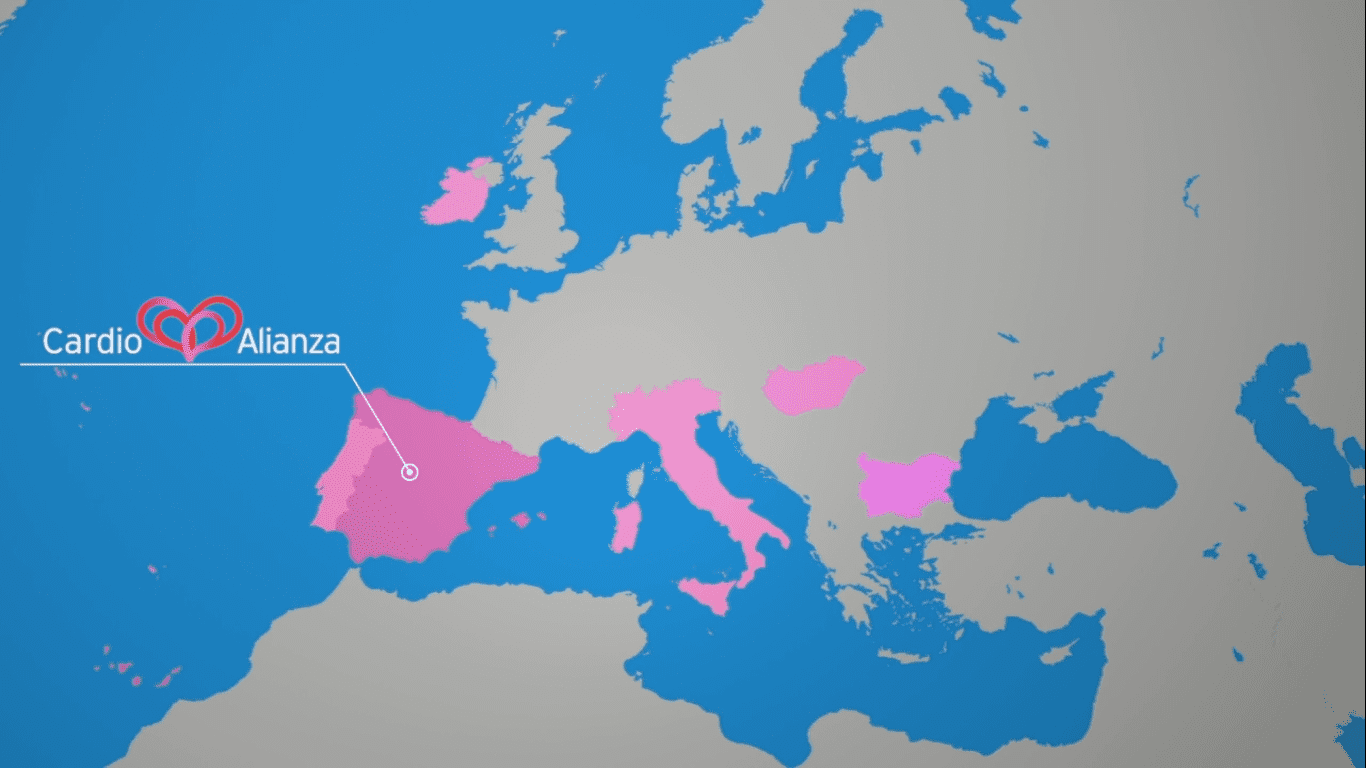Cardioalianza presents the “Cardiovascular Patients’ Declaration Regarding Therapeutic Adherence”, in which 10 European cardiovascular patients’ associations come together to promote greater therapeutic adherence.
- The “Cardiovascular Patients’ Declaration Regarding Therapeutic Adherence” is an initiative promoted with the purpose of achieving better therapeutic compliance of cardiovascular patients to reduce risk, prevent possible incidents and improve their quality of life.
- It was created with a document that includes proposals for improvement aimed at all health agents involved in caring for cardiovascular patients: health professionals, public administration and patients.
- The Patients’ Declaration is an initiative of Cardioalianza, which another nine cardiovascular patients’ organisations in Europe have already joined.
- In Spain, one in every two cardiovascular patients does not follow the therapeutic recommendations agreed with the healthcare professional, which leads to worse control of the disease, a greater number of complications and a higher cost for the healthcare system.
Madrid, 5 July 2018. Cardioalianza, the national cardiovascular patients’ association that brings together more than 50 local associations and has more than 21,000 patient members, today presented the “Cardiovascular Patients’ Declaration Regarding Therapeutic Adherence”, a document that has been endorsed by nine other European patient organisations and that has been possible thanks to the collaboration of Ferrer.
 In Spain, one in three deaths is due to a cardiovascular disease. Specifically, diseases of the circulatory system caused 30% of deaths in Spain in 2016[1], making it the leading cause of death, ahead even of tumours and respiratory diseases.
In Spain, one in three deaths is due to a cardiovascular disease. Specifically, diseases of the circulatory system caused 30% of deaths in Spain in 2016[1], making it the leading cause of death, ahead even of tumours and respiratory diseases.
Although it is true that in recent years the trend is that there are fewer and fewer deaths caused by a cardiovascular disease (myocardial infarction, stroke, heart failure, etc.), many people who do survive are coping with a disability and become chronic patients for life.
Faced with this situation, the World Health Organisation (WHO) warns that the majority of cardiovascular diseases could be prevented by promoting healthy lifestyles: a balanced diet low in fat, regular exercise, stopping smoking and reducing alcohol consumption, in addition to controlling cardiovascular risk factors, such as high blood pressure, cholesterol, diabetes and obesity, which also often require specific drug treatment.
In this sense, the studies carried out so far indicate that in Europe cardiovascular patients’ adherence to the treatment is just 57%[2], whereas in Spain it is somewhat lower, 56%, which means that only one in every two patients with a cardiovascular disease correctly follows the prescribed treatment[3].
“Undoubtedly, this data shows that therapeutic adherence involves a complex behaviour and that patients need to work on new strategies that encourage following the guidelines set by the healthcare professional, since all the studies carried out indicate that good therapeutic adherence is related to improved life expectancy and quality of life for the patient”, says Maite San Saturnino, president of Cardioalianza.
The importance of good therapeutic adherence
Therapeutic adherence is the degree to which the behaviour of a person in relation to their illness (taking the medication, following a diet and carrying out changes in the way of life) corresponds to the recommendations agreed with the health professional.
In this sense, “failure is at the origin of many medical and psychosocial complications of the disease. It has been seen that it reduces the quality of life of patients, increases the probability of the appearance of resistance to drugs and wastes healthcare resources”, says the WHO.
Specifically, and as stated in the document, non-compliance with the treatment entails more incidents related to cardiovascular diseases for the patient, which can lead to a worse quality of life or even death. On the other hand, for the healthcare professional this breach implies an increase in the care burden, due to repeated complications, which in turn are increasingly severe, and the consequent hospital admissions. This also has a direct impact on the health system, generating higher economic costs and worse health outcomes.
Thus, “the lack of therapeutic adherence is one of the most significant aspects to fight in order to achieve good prevention of high-risk cardiovascular patients”, stresses the president of Cardioalianza.
To improve this situation and empower patients, helping them to be aware of the role they play in caring for their own health and involving them in the decisions related to their cardiovascular disease, Cardioalianza is promoting the Patients’ Declaration.
“Cardiovascular Patients’ Declaration Regarding Therapeutic Adherence”
The “Cardiovascular Patients’ Declaration Regarding Therapeutic Adherence” is a document designed to promote therapeutic adherence (pharmacological and non-pharmacological) of patients with a cardiovascular disease that aims to prevent acquired disability after suffering an incident and reducing the number of avoidable deaths, in order to improve the well-being and quality of life of patients and their families.
Thus, from Cardioalianza and with the support of nine other European patient organisations that have signed the document, all health agents involved in the patient’s cardiovascular health are urged to work to improve the levels of therapeutic adherence, for which a series of proposals addressed to the patients and to health professionals and the public administration has been described.
Specifically, they focus on promoting a series of changes, such as empowering patients by involving them in the decisions that affect their disease, simplifying therapies so that they adapt better to the patient’s profile, the need to establish better doctor-patient communication, designing specific programmes to control adherence, providing patients with tools that enable them to better manage medication, promoting public campaigns on the importance of controlling risk factors, etc. In short, a series of proposals focused on improving the control of cardiovascular risk factors in addition to achieving greater therapeutic adherence.
“As patients and agents involved in health care, we must work together with professionals and the public administration to promote heart-healthy environments that encourage self-care, especially among those who have already suffered a cardiovascular incident and who, therefore, are at greater risk”, says Maite San Saturnino.
European entities signing and endorsing the Declaration:
 Associazione per la Lotta alla Trombosi e alle malattie cardiovascolari (ALT) – Italy
Associazione per la Lotta alla Trombosi e alle malattie cardiovascolari (ALT) – Italy- Associazione Italiana Scompensati Cardiaci (AISC) – Italy
- Association of Patients with Cardiovascular Diseases – Bulgaria
- Bate Bate Coraçao – Portugal
- Fundaçao Portuguesa Cardiologia – Portugal
- Mon Coeur Entre Parenthèses (ASBL) – Belgium
- SZÍVSN Országos betegegyesület – Hungary
- CROÍ, The West of Ireland Cardiac Foundation – Ireland
- National Institute for Preventive Cardiology (NIPC) – Ireland
* Download the “Cardiovascular Patients’ Declaration Regarding Therapeutic Adherence“
* Link to the project’s website and video presentation
_________________
About Cardioalianza
Cardioalianza is an association that brings together 16 non-profit organisations, with more than 50 points of care throughout Spain that are dedicated to improving the quality of life and well-being of people with a cardiovascular disease. Its vision is to be the leading independent and sustainable organisation for patients with cardiovascular diseases and the representative of their rights and needs before the stakeholders involved in prevention, diagnosis and treatment to achieve personalised and comprehensive care.
Its main objectives are to empower patients and patient organisations to promote active participation, cooperate with Public Administrations and other agents of the social and healthcare system to improve patients’ well-being and quality of life and generate knowledge about cardiovascular patients’ situations and needs and develop strategic alliances with other related organisations, scientific entities, professional organisations and companies in the social and healthcare industry.
For further information about Cardioalianza click here.
Cardioalianza communication:
Meritxell Mercader
+34 656 63 85 41 / +34 931061759
comunicacion@cardioalianza.org
[1] National Institute of Statistics Data (INE). Death statistics, according to cause of death. Detailed results. 2016
[2] Naderi SH, Bestwick JP, Wald DS. (2012) Adherence to drugs that prevent cardiovascular disease: meta-analysis on 376,162 patients. Am J Med; 125: 882-887.
[3] Restovic Camus, G. et al. (2016) Treatment adherence plan. Responsible use of medication. Farmaindustria and EY.

 Associazione per la Lotta alla Trombosi e alle malattie cardiovascolari (ALT) – Italy
Associazione per la Lotta alla Trombosi e alle malattie cardiovascolari (ALT) – Italy